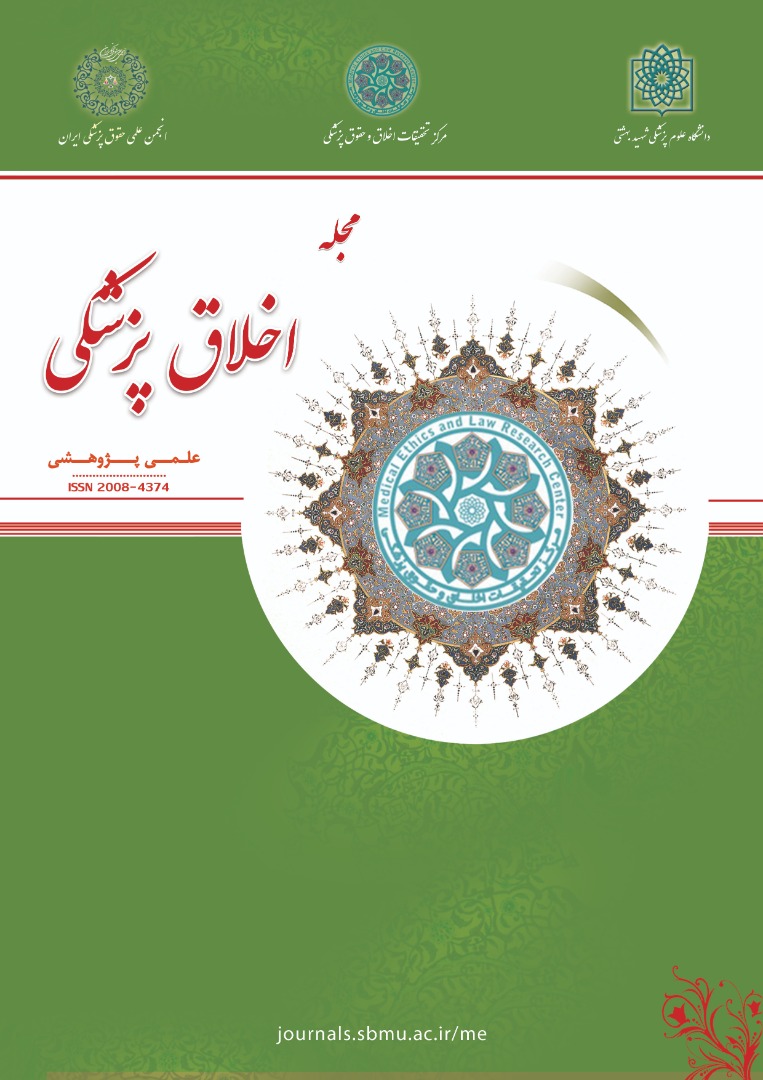درک پرستاران از جوّ اخلاقی حاکم بر بیمارستانهای آموزشی وابسته به دانشگاه علوم پزشکی شهید صدوقی یزد
مجله اخلاق پزشکی - علمی پژوهشی,
دوره 8 شماره 29 (1393),
1 October 2014
,
صفحه 41-65
https://doi.org/10.22037/mej.v8i29.7184
چکیده
جوّ اخلاقی بیمارستان نوعی از جوّ سازمانی است که متشکل از روابط بین فردی پرسنل درمان و ارتباطات پرسنل با بیماران و خانواده آنها میباشد. از آنجایی که جوّ اخلاقی میتواند تحت تأثیر عوامل و شرایط مختلف کاری و سیاستهای مدیریتی باشد، احتمال میرود که از سازمانی به سازمان دیگر متفاوت باشد. بنابراین مطالعه حاضر با هدف بررسی درک پرستاران نسبت به جوّ اخلاقی حاکم بر بیمارستانهای آموزشی شهر یزد طراحی و اجرا گردیده است. این مطالعه توصیفی مقطعی و با استفاده از پرسشنامه جوّ اخلاقی بیمارستان اولسون، بر روی 370 نفر از پرستاران شاغل در بیمارستانهای مربوطه در سال 1391 اجرا شد. یافتههای مطالعه نشان داد که میانگین درک پرستاران از جوّ اخلاقی حاکم بر بیمارستانهای آموزشی شهر یزد (0/78±3/22) میباشد. مطلوبترین جوّ در حیطه مدیران (0/98±3/56) و نامطلوبترین جوّ در حیطه پزشکان (0/87±2/83) به دست آمد. همچنین جوّ اخلاقی با جنسیت (0/05=P) و تأهل (0/001=P) رابطه معناداری داشت. با توجه به نمره جوّ اخلاقی کسبشده در این مطالعه که از سایر مطالعههای انجامگرفته در این زمینه در ایران کمتر میباشد و با توجه به اهمیت موضوع جوّ اخلاقی و عواقب ناشی از نقص در این جوّ ، لذا لازم است تا مسؤولین و سیاستگزاران بیمارستانها برنامهریزیهای مناسبی را جهت حاکمنمودن جوّ اخلاقی مطلوبتر بکار بندند.
- جوّ اخلاقی بیمارستان؛ بیمارستان؛ پرسشنامه اولسون؛ پرستاران
ارجاع به مقاله
مراجع
Aiken, LH. Clarke, SP. Sloane, DM. Sochalski, JA. Busse, R. Clarke, H. Giovannetti, P. Hunt, J. Rafferty, AM. Shamian, J. (2001). Nurses’ reports on hospital care in five countries. Health affairs. 20 (3): 43-53.
Bahcecik, N. Oztürk, H. (2003). The hospital ethical climate survey in Turkey. JONA'S healthcare law, ethics and regulation. 5 (4): 94-98.
Borhani, F. Jalali, T. Abbaszadeh, A. Haghdoost, AA. Amiresmaili, M. (2012). Nurses’ perception of ethical climate and job satisfaction. J Med Ethics. 5: 6.
Corley, MC. Minick, P. Elswick, R. Jacobs, M. (2005). Nurse moral distress and ethical work environment. Nursing Ethics. 12 (4): 381-90.
Deshpande, SP. Joseph, J. (2009). Impact of emotional intelligence, ethical climate, and behavior of peers on ethical behavior of nurses. Journal of Business Ethics. 85 (3): 403-10.
Fogel, KM. (2007). The relationships of moral distress, ethical climate, and intent to turnover among critical care nurses: 96-7.
Foladvand, kh. (2006). Investigate the relationship between organizational climate governmental mental hospital in Ilam city. Medical Journal Iran. 15 (1): 44-50.
Hart, SE. (2005). Hospital ethical climates and registered nurses' turnover intentions. Journal of Nursing Scholarship. 37 (2): 47-51.
Jalali, T. Abbaszadeh, A. Borhani, F. Haghdoost, AA. Amiresmaili, MR. (2011). Nurses' attitud about ethical climate the teaching hospital affiliated with the University of Medical Sciences Kerman. J Medical Ethics. 5 (17): 27-44.
Joolaee, S. Jalili, H. Rafiee, F. Haggani, H. (2011). The relationship between nurses’ perception of moral distress and ethical environment in TehranUniversity of Medical Sciences. Iran J Med Ethics Hist Med .4(4): 56-66.
Karimi, M. Rajaepur, S. Hoveyda, R. (2009). The relationship between organizational climate and ethical behavior among employees, Isfahan University and University of Medical Sciences Isfahan. Journal of Leadership and Management Garmsar, Islamic Azad University. 4 (1): 83-102.
Keshtkaran, A. (1995). The relationship between stress and depletion strain among nurses of Shiraz University of Medical Sciences. Journal Knowledge Management. 2 (36): 29-38.
Kopelman, R. Brief, A. Guzzo, R. (1990). The role of climate and culture in productivity. 282-318.
Martin, KD. Cullen, JB. (2006). Continuities and extensions of ethical climate theory: A meta-analytic review. Journal of Business Ethics. 69 (2): 175-94.
McDaniel, C. (1999). Ethical environment: reports of practicing nurses. The Nursing Clinics of North America. 33 (2): 363-72.
Nakhae, N. Mobasher, M. Garusi, S. (2007). Assessment of ethical climate (organizational culture) hospitals in Kerman. Iran J Med Ethics Hist Med. 1 (1): 45-52.
Olson, L. (1995). Ethical climate in health care organizations. International nursing review. 42 (3): 85-90.
Olson, L. (2002). Ethical climate as the context for nurse retention. Chart. 99 (6): 3-7.
Olson, LL. (1998). Hospital nurses' perceptions of the ethical climate of their work setting. Journal of Nursing Scholarship. 30 (4): 345-9.
Pauly, B. Varcoe, C. Storch, J. Newton, L. (2009). Registered nurses’ perceptions of moral distress and ethical climate. Nursing Ethics. 16 (5): 561-73.
Polat, E. (1999). An Investigation ofMid-level Managers’ Values about Life and Work. Institute for Social Sciences. 66-76.
Rahimniya, F. Nikkhah Farahani, Z. (2010). The impact of ethical climate of the organization's corporate identity and a desire to leave the service Sellers. Journal Ethics in Science and Technology. 6 (4): 1-11.
Schneider, B. (1975). Organizational climates: An essay1. Personnel Psychology. 28 (4): 447-79.
Shapira-Lishchinsky, O. Rosenblatt, Z. (2010). School ethical climate and teachers' voluntary absence. Journal of Educational Administration. 48 (2): 164-81.
Ulrich, C. O’Donnell, P. Taylor, C. Farrar, A. Danis, M. Grady, C. (2007). Ethical climate, ethics stress, and the job satisfaction of nurses and social workers in the United States. Social Science & Medicine. 65 (8): 1708-19
- چکیده مشاهده شده: 425 بار
- PDF (English) دانلود شده: 222 بار
